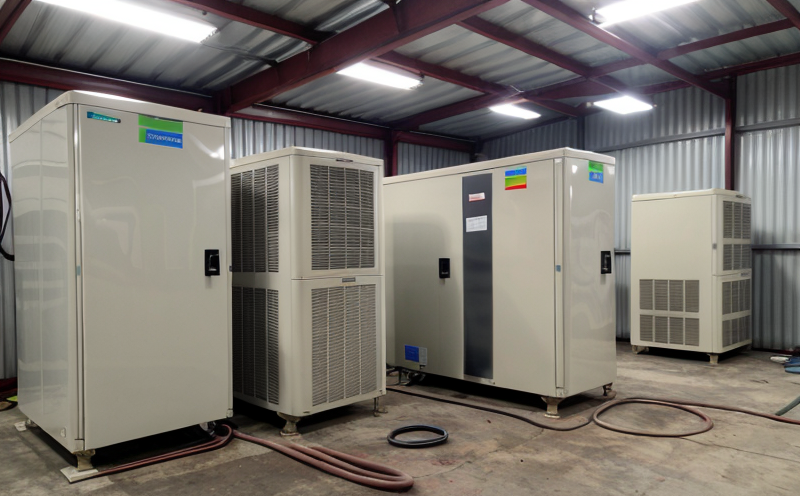ISO 5149-6 Refrigerant System Performance under Operational Conditions
The ISO 5149 series of standards provides comprehensive guidelines for the testing and evaluation of refrigeration systems, with specific focus on the performance characteristics under operational conditions. The sixth part of this standard (ISO 5149-6) is dedicated to assessing the refrigerant system's performance in real-world scenarios that mimic actual use.
This service ensures compliance with international standards by evaluating how efficiently a refrigeration system operates when exposed to typical environmental conditions and operational parameters. The test protocol involves subjecting the system to various stress factors such as temperature variations, pressure fluctuations, and varying loads, all while monitoring key performance indicators like energy efficiency, capacity, and reliability.
The testing process begins with a thorough inspection of the refrigeration equipment and its components to ensure they meet the required specifications. Once approved, the system is then installed in our climate-controlled environmental chambers designed to replicate real-world conditions found across different geographical locations. These chambers can simulate temperatures ranging from -20°C to +45°C and humidity levels between 10% RH to 95% RH.
During testing, the refrigerant is continuously monitored for purity and integrity using advanced analytical instruments. This includes measuring the concentration of different types of refrigerants present in the system, checking for any contamination or impurities that could affect performance. Leakage detection plays a crucial role here; our state-of-the-art equipment employs ultrasonic leak detectors capable of identifying even minute leaks within the system.
The test duration varies depending on the complexity and size of the refrigeration unit being evaluated but generally lasts around 48 hours for smaller systems up to several days for larger installations. Throughout this period, continuous data logging ensures accurate measurement of all relevant parameters such as power consumption, cooling capacity, and overall efficiency.
At the end of each test run, comprehensive reports are generated detailing findings including pass/fail status based on predefined acceptance criteria outlined in ISO 5149-6. These reports serve multiple purposes ranging from internal quality assurance to supporting external audits conducted by regulatory bodies or insurance companies.
The importance of this service cannot be overstated given the increasing emphasis on energy conservation and environmental protection in today’s world. By ensuring that refrigeration systems meet stringent performance standards, we contribute towards reducing greenhouse gas emissions associated with inefficient units while also promoting sustainable practices within our clients’ operations.
Eurolab Advantages
EuroLab offers unparalleled expertise in HVAC equipment testing, leveraging decades of experience and cutting-edge technology to deliver accurate and reliable results. Our team consists of highly skilled professionals who stay updated with the latest developments in refrigeration technology and relevant standards.
Our state-of-the-art facilities provide a controlled environment where tests can be conducted under simulated real-world conditions. This ensures that the results are reflective of actual performance rather than idealized scenarios. We use only the most precise measurement instruments, including high-tech leak detectors and data logging systems, to obtain accurate readings.
One significant advantage of EuroLab lies in our ability to offer rapid turnaround times without compromising on quality. Our streamlined processes allow us to start testing as soon as a sample is received, minimizing delays between submission and completion of tests. Additionally, our flexible pricing structure enables us to accommodate various budget constraints.
Another key benefit provided by EuroLab is our commitment to confidentiality. All test data remains strictly confidential unless otherwise agreed upon with the client. This allows our customers peace of mind knowing that their proprietary information will be protected throughout the testing process and beyond.
EuroLab also prides itself on its excellent customer service, which extends from initial consultation through final delivery of reports. Our dedicated staff members are always available to answer questions or provide guidance whenever needed during any stage of the project lifecycle.
Environmental and Sustainability Contributions
The refrigeration industry plays a vital role in maintaining comfort levels globally; however, it also faces significant challenges related to environmental impact. EuroLab recognizes these issues and actively contributes towards addressing them through our services.
By ensuring that refrigeration systems operate efficiently according to ISO 5149-6 guidelines, we help minimize energy consumption and reduce carbon footprints associated with HVAC operations. Efficiently managed refrigerants contribute positively to climate change mitigation efforts by reducing the release of potent greenhouse gases into the atmosphere.
Moreover, EuroLab supports sustainable practices in several ways beyond just testing services. For instance, our facility uses renewable energy sources wherever possible and implements recycling programs for waste generated during tests. Such initiatives reflect our commitment to environmental stewardship and promote a greener future.
Use Cases and Application Examples
The ISO 5149-6 refrigerant system performance assessment is applicable across numerous industries, including commercial buildings, industrial plants, food processing facilities, and more. Here are some specific instances where this service would prove beneficial:
Commercial Buildings: Ensuring that newly installed or retrofitted HVAC systems meet efficiency standards helps reduce operational costs while enhancing occupant comfort levels.
Industrial Plants: By verifying the performance of large-scale refrigeration units, plant managers can identify areas for improvement leading to increased productivity and lower maintenance expenses.
Food Processing Facilities: Accurate testing ensures that temperature control systems are functioning optimally, thereby preserving product quality and extending shelf life.





